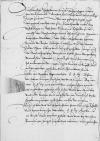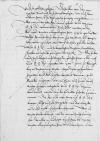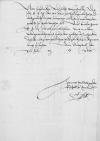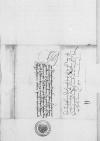Wie wir gestriges tages / aus dem gesprech, / welches wir zum Dietrichswalde (Gietrzwałd), village SE of Allenstein (Olsztyn), roughly halfway between Löbau (Lubawa) and Heilsberg (Lidzbark Warmiński)⌊DittrichswaldeDietrichswalde (Gietrzwałd), village SE of Allenstein (Olsztyn), roughly halfway between Löbau (Lubawa) and Heilsberg (Lidzbark Warmiński)⌋ neben dem hochwirdigen in Goth herrn Tiedemann Giese (Tidemannus Gisius) (*1480 – †1550), in 1519 ennobled by King Sigismund I; 1504-1538 Canon of Ermland (Warmia); 1516-1527, 1533-1537 Judicial Vicar and Vicar General of Ermland; 1523-1538 Custos of Ermland; 1537-1549 Bishop of Kulm (Chełmno); 1549-1550 Bishop of Ermland (BORAWSKA 1984, passim)⌊Tidemanno bischoffen zu ColmensheTiedemann Giese (Tidemannus Gisius) (*1480 – †1550), in 1519 ennobled by King Sigismund I; 1504-1538 Canon of Ermland (Warmia); 1516-1527, 1533-1537 Judicial Vicar and Vicar General of Ermland; 1523-1538 Custos of Ermland; 1537-1549 Bishop of Kulm (Chełmno); 1549-1550 Bishop of Ermland (BORAWSKA 1984, passim)⌋, / dem großmechtigen herrn Achatius von Zehmen (Achacy Cema) (*ca. 1485 – †1565), 1517-1531 Chamberlain of Pomerania, 1531-1546 Castellan of Gdańsk (Danzig), 1545-1546 Voivode of Kulm (Chełmno), 1546-1565 Voivode of Marienburg (Malbork) (SBPN 1, p. 194-195; ORACKI 1984, p. 38-39; Urzędnicy 5/2, p. 198; PSB 4, p. 325-326)⌊Achatio CzemenAchatius von Zehmen (Achacy Cema) (*ca. 1485 – †1565), 1517-1531 Chamberlain of Pomerania, 1531-1546 Castellan of Gdańsk (Danzig), 1545-1546 Voivode of Kulm (Chełmno), 1546-1565 Voivode of Marienburg (Malbork) (SBPN 1, p. 194-195; ORACKI 1984, p. 38-39; Urzędnicy 5/2, p. 198; PSB 4, p. 325-326)⌋ marienburgischenn woiwoden etc., dem edlen wolgebornen herrnn Johann von Baysen (Jan Bażyński) (†1548), 1532-1546 Chamberlain of Marienburg; in 1546 Castellan of Gdańsk; 1546-1547 - of Elbing; 1546 Starost of Mewe, Schoneck, and Sobbowitz (PSB 1, p. 377; Urzędnicy 5/2, p. 195)⌊Hannsen von BaisenJohann von Baysen (Jan Bażyński) (†1548), 1532-1546 Chamberlain of Marienburg; in 1546 Castellan of Gdańsk; 1546-1547 - of Elbing; 1546 Starost of Mewe, Schoneck, and Sobbowitz (PSB 1, p. 377; Urzędnicy 5/2, p. 195)⌋, elbischen castellan, / unnd der dreier stedten Thorn (Toruń, Thorunium), city in northern Poland, on the Vistula river in its lower reaches, main residence of the bishops of Kulm (Chełmno); one of the three Great Prussian Cities (along with Gdańsk and Elbing) which had representatives in the Council of Royal Prussia; a member of the Hanseatic League⌊ThornThorn (Toruń, Thorunium), city in northern Poland, on the Vistula river in its lower reaches, main residence of the bishops of Kulm (Chełmno); one of the three Great Prussian Cities (along with Gdańsk and Elbing) which had representatives in the Council of Royal Prussia; a member of the Hanseatic League⌋, / Elbing (Elbląg), city in northern Poland, Pomerania, on the Vistula Lagoon, one of the three Great Prussian Cities (beside Gdańsk (Danzig) and Thorn (Toruń)) which had representatives in the Prussian Council; member of the Hanseatic League⌊ElbingElbing (Elbląg), city in northern Poland, Pomerania, on the Vistula Lagoon, one of the three Great Prussian Cities (beside Gdańsk (Danzig) and Thorn (Toruń)) which had representatives in the Prussian Council; member of the Hanseatic League⌋ unnd Gdańsk (Danzig, Dantiscum), city in northern Poland, on the Bay of Gdańsk at the mouth of the Vistula, on the Baltic, the biggest and wealthiest of the three Great Prussian Cities (Gdańsk, Thorn (Toruń), and Elbing (Elbląg)) with representation in the Council of Royal Prussia; a member of the Hanseatic League⌊DantzigkGdańsk (Danzig, Dantiscum), city in northern Poland, on the Bay of Gdańsk at the mouth of the Vistula, on the Baltic, the biggest and wealthiest of the three Great Prussian Cities (Gdańsk, Thorn (Toruń), and Elbing (Elbląg)) with representation in the Council of Royal Prussia; a member of the Hanseatic League⌋ geschickten / dartzu auch der großmechtige herr Stanisław Kostka (*1487 – †1555), as a leader of the so-called nobles' party active in Royal Prussia since 1536, Kostka stood in opposition to most of the members of the Council of Royal Prussia, who wanted to maintain the autonomy of the province and a "balance of power" in terms of governance. The tension between the Prussian Subtreasurer and the Council had been increasing since the Diet in Graudenz (Grudziądz) in 1533. Kostka, connected with the royal court since his youth, was sent to Graudenz as the King's deputy and, contrary to custom, decided to take part in the proceedings. In response to such a step, the Council members stopped the meeting. Kostka accused them of hostility towards the Poles and intervened on this matter at the court. In the absence of the then Bishop of Ermland (Mauritius Ferber) it was Dantiscus who chaired the Graudenz Diet. The incident badly harmed his future relationships with Kostka; 1531-1555 Treasurer of the Prussian lands and Treasurer of Marienburg (Malbork); 1544-1545 Castellan of Elbing (Elbląg), 1545-1546 Castellan of Kulm (Chełmno); 1546-1549 Vice-Voivode of Kulm; 1546-1551 Voivode of Pomerania; 1551-1555 Voivode of Kulm (PSB 14, p. 356; Urzędnicy 5/2, p. 216; MAŁŁEK 1976, p. 119-123)⌊Stanislaus Costka vonn StangenbergStanisław Kostka (*1487 – †1555), as a leader of the so-called nobles' party active in Royal Prussia since 1536, Kostka stood in opposition to most of the members of the Council of Royal Prussia, who wanted to maintain the autonomy of the province and a "balance of power" in terms of governance. The tension between the Prussian Subtreasurer and the Council had been increasing since the Diet in Graudenz (Grudziądz) in 1533. Kostka, connected with the royal court since his youth, was sent to Graudenz as the King's deputy and, contrary to custom, decided to take part in the proceedings. In response to such a step, the Council members stopped the meeting. Kostka accused them of hostility towards the Poles and intervened on this matter at the court. In the absence of the then Bishop of Ermland (Mauritius Ferber) it was Dantiscus who chaired the Graudenz Diet. The incident badly harmed his future relationships with Kostka; 1531-1555 Treasurer of the Prussian lands and Treasurer of Marienburg (Malbork); 1544-1545 Castellan of Elbing (Elbląg), 1545-1546 Castellan of Kulm (Chełmno); 1546-1549 Vice-Voivode of Kulm; 1546-1551 Voivode of Pomerania; 1551-1555 Voivode of Kulm (PSB 14, p. 356; Urzędnicy 5/2, p. 216; MAŁŁEK 1976, p. 119-123)⌋ pomerelischer woiwode etc. gewilliget / unnd sein meynung hat einbringen lassen / wegen dieses landes nodturfft / und anligen gehalten / gescheiden / unnd alhie ankomen seindt, / haben wir ungefher kegenwertigen E(wer) F(urstlichen) D(urchlauch)t bothenn / den erbarn Cuntzen Truchses / vor unns funden, / bey dem wir E(wer) F(urstlichen) D(urchlauch)t aus freuntlichem nachparlichenn gemut / wie in gedachtem gespreche alle sachen vorbliben / unnd bey unns allen bewogen / unnd endtschlossen sein / durch diß unser shreyben antzutzeigen / nicht haben nachlassen mugenn / unnd ist vonn uns und hochgedachtenn herrn Tiedemann Giese (Tidemannus Gisius) (*1480 – †1550), in 1519 ennobled by King Sigismund I; 1504-1538 Canon of Ermland (Warmia); 1516-1527, 1533-1537 Judicial Vicar and Vicar General of Ermland; 1523-1538 Custos of Ermland; 1537-1549 Bishop of Kulm (Chełmno); 1549-1550 Bishop of Ermland (BORAWSKA 1984, passim)⌊colmischen bishoffeTiedemann Giese (Tidemannus Gisius) (*1480 – †1550), in 1519 ennobled by King Sigismund I; 1504-1538 Canon of Ermland (Warmia); 1516-1527, 1533-1537 Judicial Vicar and Vicar General of Ermland; 1523-1538 Custos of Ermland; 1537-1549 Bishop of Kulm (Chełmno); 1549-1550 Bishop of Ermland (BORAWSKA 1984, passim)⌋ / unnd Achatius von Zehmen (Achacy Cema) (*ca. 1485 – †1565), 1517-1531 Chamberlain of Pomerania, 1531-1546 Castellan of Gdańsk (Danzig), 1545-1546 Voivode of Kulm (Chełmno), 1546-1565 Voivode of Marienburg (Malbork) (SBPN 1, p. 194-195; ORACKI 1984, p. 38-39; Urzędnicy 5/2, p. 198; PSB 4, p. 325-326)⌊marienburgischen woiwodenAchatius von Zehmen (Achacy Cema) (*ca. 1485 – †1565), 1517-1531 Chamberlain of Pomerania, 1531-1546 Castellan of Gdańsk (Danzig), 1545-1546 Voivode of Kulm (Chełmno), 1546-1565 Voivode of Marienburg (Malbork) (SBPN 1, p. 194-195; ORACKI 1984, p. 38-39; Urzędnicy 5/2, p. 198; PSB 4, p. 325-326)⌋ E(wer) F(urstlichen) D(urchlauch)t shreyben / so an unnser dreier personen gestalt / unnd unns bey unnserm kamerjungen jungst zugefertiget wordenn / alda gebrochen  GStA PK, HBA, C1 No 1092, 2 unnumbered unnd semptlichen gelesen. / Deshalben wir den am meisten unns auch da zusamen vorfuget / das auch denn anderen herrn so da kegenwertig gewesen mitgeteilt. /
GStA PK, HBA, C1 No 1092, 2 unnumbered unnd semptlichen gelesen. / Deshalben wir den am meisten unns auch da zusamen vorfuget / das auch denn anderen herrn so da kegenwertig gewesen mitgeteilt. /
Was wir nu vor bedenckhen darauf gehabt / unnd wie wir E(wer) F(urstlichen) D(urchlauch)t volmeinendem roth, / solches weytter an die koe(nigliche)n ma(iesta)t unnsern allergnedigsten herrn zugelangen lassen, / welches den auch also zu bequemer zeit von unns soll vorgestelt werden, / gevolget / unnd unns den haben gefallen lassen / wirdt E(wer) F(urstliche) D(urchlauch)t aus hiebeygelegtem unnserm semptlichem shreyben an diesulbe genugsam vornemen. /
Wir haben auch in sunderheit nicht vorgessen / gedachte herrn alle / noch laut E(wer) F(urstlichen) D(urchlauch)t schreyben den XVII(en) Iunii zu Königsberg (Królewiec, Mons Regius, Regiomontium), city in Ducal Prussia, on the mouth of the Pregel (Pregoła) river, capital city of Ducal Prussia; today Kaliningrad in Russia⌊KonigsbergKönigsberg (Królewiec, Mons Regius, Regiomontium), city in Ducal Prussia, on the mouth of the Pregel (Pregoła) river, capital city of Ducal Prussia; today Kaliningrad in Russia⌋ an unnsere einige person / wegen dieser geshwindenn getzeitten unnd des deutschen meisters vornemen / unnd practiken ausgangen / das wir ihnen auch zuvor durch unnser shreyben / mitgeteilt / unnd E(wer) F(urstliche) D(urchlauch)t darinn beandtwurdt, / weiter daruber bedencken zuhaben zuvormanen, / die den alle neben unns auf E(wer) F(urstlichen) D(urchlauch)t bewegen / solchs auch gleicher gestalt / wie das letzste / an die ko(niglich)e ma(iesta)tt zushreiben / beharret. /
Was nu unnser person belangt / wollen wir auch nicht seumig sein / des alles in sunderheit / bey beidten Sigismund I Jagiellon (Zygmunt I) (*1467 – †1548), King of Poland and Grand Duke of Lithuania (1506-1548); Duke of Głogów (Glogau) (1499-1506), Duke of Opava (1501-1506), Governor of Silesia (1504-1506); son of King Kazimierz IV Jagiellon and Elisabeth of Austria
Sigismund II Augustus Jagiellon (Zygmunt II August) (*1520 – †1572), 1529-1572 Grand Duke of Lithuania (ruled from 1544); 1530-1572 King of Poland (crowned vivente rege (ruled from 1548, after the death of his father); son of Sigismund I Jagiellon and Bona Sforza⌊ko(nigliche)n ma(iesta)tt(en)Sigismund I Jagiellon (Zygmunt I) (*1467 – †1548), King of Poland and Grand Duke of Lithuania (1506-1548); Duke of Głogów (Glogau) (1499-1506), Duke of Opava (1501-1506), Governor of Silesia (1504-1506); son of King Kazimierz IV Jagiellon and Elisabeth of Austria
Sigismund II Augustus Jagiellon (Zygmunt II August) (*1520 – †1572), 1529-1572 Grand Duke of Lithuania (ruled from 1544); 1530-1572 King of Poland (crowned vivente rege (ruled from 1548, after the death of his father); son of Sigismund I Jagiellon and Bona Sforza⌋ unnsern allergnedigsten herrn unnd andern herrn in der  GStA PK, HBA, C1 No 1092, 3 unnumbered Poland (Kingdom of Poland, Polonia)⌊ChronPoland (Kingdom of Poland, Polonia)⌋ zugedencken / unnd solchs vortzustellen / das sich E(wer) F(urstliche) D(urchlauch)t / der wir idere zeit viel freuntlichs unnd nachparlichs dinstes zuertzeigen willig unnd erputtig sein / gewisse zu unns vorsehen soll. /
GStA PK, HBA, C1 No 1092, 3 unnumbered Poland (Kingdom of Poland, Polonia)⌊ChronPoland (Kingdom of Poland, Polonia)⌋ zugedencken / unnd solchs vortzustellen / das sich E(wer) F(urstliche) D(urchlauch)t / der wir idere zeit viel freuntlichs unnd nachparlichs dinstes zuertzeigen willig unnd erputtig sein / gewisse zu unns vorsehen soll. /
Unnd bevelen hiemit E(wer) F(urstliche) D(urchlauch)t die wir freuntlich bitten / unns in allter unnd gewönlicher gunst zuerhalten / götlicher allmechtigkeit / dieselbe mit gutter gesundtheit unnd geluckseligem regiment lange zu fristen. /
 GStA PK, HBA, C1 No 1092, 4 unnumbered
GStA PK, HBA, C1 No 1092, 4 unnumbered
 GStA PK, HBA, C1 No 1092, 1 unnumbered
GStA PK, HBA, C1 No 1092, 1 unnumbered
 GStA PK, HBA, C1 No 1092, 2 unnumbered unnd semptlichen gelesen. / Deshalben wir den am meisten unns auch da zusamen vorfuget / das auch denn anderen herrn so da kegenwertig gewesen mitgeteilt. /
GStA PK, HBA, C1 No 1092, 2 unnumbered unnd semptlichen gelesen. / Deshalben wir den am meisten unns auch da zusamen vorfuget / das auch denn anderen herrn so da kegenwertig gewesen mitgeteilt. /
 GStA PK, HBA, C1 No 1092, 3 unnumbered
GStA PK, HBA, C1 No 1092, 3 unnumbered 


